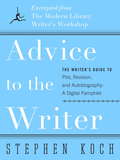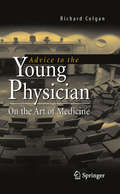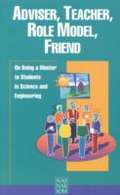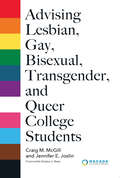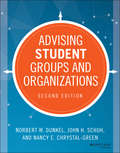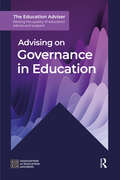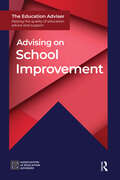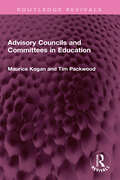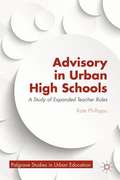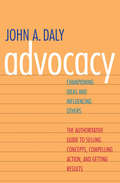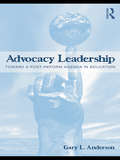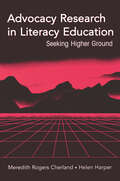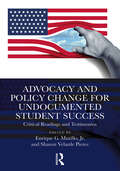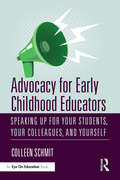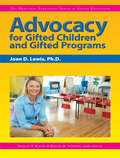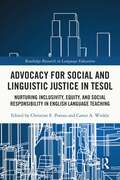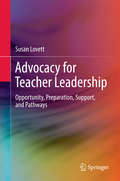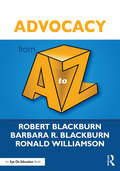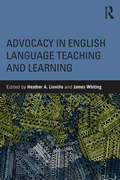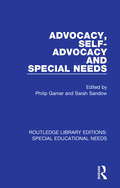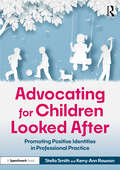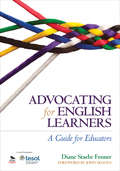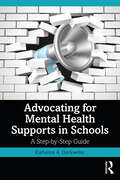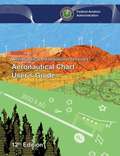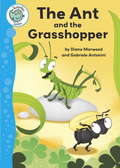- Table View
- List View
Advice to the Writer
by Stephen KochFrom Stephen Koch, former chair of Columbia University's graduate creative writing program, comes essential and practical advice drawn from The Modern Library Writer's Workshop. With nearly thirty years of teaching experience, Stephen Koch has earned a reputation as an astute and benevolent mentor; and with Advice to the Writer, his lucid observations and commonsense techniques have never been more accessible. Here Koch dispenses sound guidance for those moments when the muse needs a little help finding her way: in "Shaping the Story," he untangles plot; in "Working and Reworking," he explains the most teachable (yet least often taught) of all writerly skills: revision; and in "The Story of the Self," he delves into autobiography. Featuring handpicked commentary from some of our greatest authors, Advice to the Writer is a unique introduction to this maddening and intoxicating pursuit. Praise for Stephen Koch's The Modern Library Writer's Workshop "An extraordinarily comprehensive and practical work by a master craftsman and a master analyst of the craft."--Madison Smartt Bell, author of All Souls' Rising and Anything Goes "Stephen Koch was my teacher long ago. Now he is everyone's teacher, indelibly. This is a book not just for the beginning writer but for every writer."--Martha McPhee, author of the National Book Award nominee Gorgeous Lies "The Modern Library Writer's Workshop is a treasure trove of wisdom, both immensely practical and philosophical, entertaining and thought-provoking. Koch takes us inside the writing process, and it is impossible not to emerge transformed."--Joanna Hershon, author of Swimming
Advice to the Young Physician: On the Art of Medicine
by Richard ColganAdvice to the Young Physician introduces the origins of important teachings that form the basis of medicine as it has been taught by some of history's greatest educators in medicine. Advice to the Young Physician reveals how to make the transition from technician to healer. This book reinforces the humanistic side of patient care, which is often overshadowed by the focus on highly technological elements. Medical students, residents, fellows, physicians, and allied health practitioners often forget the intricacies of the genomic makeup of adenoviruses, yet they remember the tips, anecdotes and aphorisms related by mentors, educators, and experienced physicians. The art of medicine comes from insights gained from unique and dynamic experiences between the physician, an enthusiastic medical student and the human patient, and is rarely found in books or taught in a universal and systematic way. Advice to the Young Physician provides numerous examples of best practices in order to internalize and practice the art of medicine, including tenets taught by Hippocrates, Maimonides, Osler, Peabody, Schweitzer and others. Advice to the Young Physician targets aspiring and new physicians with the intent to make them better physicians. It hits the mark. An effective mix of the writings of some of medicine's giants, as well as clinical experiences of the author, the book offers an historical framework and personal context to understand the attributes and attitudes of the good physician. It is a quick read that rewards the reader with a sampling of 4000 years of medical wisdom sprinkled with practical advice for the modern day doctor. --Richard G. Roberts, MD, JD, Professor of Family Medicine, University of Wisconsin School of Medicine and Public Health, President World Organization of Family Doctors, Past President American Academy of Family Physicians This is a small book and easy to read. It comprises several inspiring sketches of ancient and modern physicians whose reputations were based as much on their dedication to the humanism of medicine as it was to the science of medicine. Those who teach medical students and residents will find it a good source of medical history that, besides being important in itself, will add a new dimension and a little lightness to morning rounds. The author makes it clear that in our era of high technology it is easy to underestimate the importance of uniting humanism with science in caring for the sick. He also provides some practical information on such topics as how to present a case to attending physicians and how to communicate well with patients. The ancient physicians that history remembers were not only astute observers of signs and symptoms but also were deeply concerned about the psychological health of their patients and how disturbances in their emotional health often manifested in physical symptoms. Colgan starts with Hippocrates and Maimonides whose names many young physicians are familiar with. The former for the aphorism "first do no harm" and the latter for being one of the first to call medicine a "vocation" and a "calling." The following "greats" are included in the book: Dr Albert Schweitzer whose "reverence for life" led him to his missionary medical work in Africa. He wrote Out of My Life and Thought and received the Nobel Peace Prize in 1952. Sir William Osler (1849-1919), known to some as the father of internal medicine, was a respected physician and teacher. He was the author of the Principles and Practice of Medicine, used for decades as the bible of medicine. But his fame rested equally on his dedication as a mentor to young physicians. He often gave graduation addresses to medical students reminding them to maintain a life-long interest in continuous learning and to treat the whole patient not just the disease. Francis Weld Peabody (1881-1927) a teacher at Harvard who had written a book The Care of the Patient in which he discussed how older practitioners often complained that younger doctors' mindsets were so often over-concerned with testing that they sometimes fo...
Adviser, Teacher, Role Model, Friend: On Being a Mentor to Students in Science and Engineering
by National Academy of Engineering Staff National Academy of Sciences Staff Institute of Medicine StaffThis guide offers helpful advice on how teachers, administrators, and career advisers in science and engineering can become better mentors to their students. It starts with the premise that a successful mentor guides students in a variety of ways: by helping them get the most from their educational experience, by introducing them to and making them comfortable with a specific disciplinary culture, and by offering assistance with the search for suitable employment. Other topics covered in the guide include career planning, time management, writing development, and responsible scientific conduct. Also included is a valuable list of bibliographical and Internet resources on mentoring and related topics. Single copy, $19.95; 2-9 copies, $17.50 each; 10 or more copies, $16.95 (no other discounts apply).
Advising Lesbian, Gay, Bisexual, Transgender, and Queer College Students
by Craig M. McGillCo-published with NACADA.Changes on college and university campuses have echoed changes in U.S. popular culture, politics, and religion since the 1970s through unprecedented visibility of LGBTQA persons and issues. In the face of hostile campus cultures, LGBTQA students rely on knowledgeable academic advisors for support, nurturance, and the resources needed to support their persistence. This edited collection offers theoretical understanding of the literature of the field, practical strategies that can be implemented at different institutions, and best practices that helps students, staff, and faculty members understand more deeply the challenges and rewards of working constructively with LGBTQA students. In addition, allies in the field of academic advising (both straight/cis-identified and queer) reflect on becoming an ally, describe obstacles and challenges they have experienced and offer advice to those seeking to deepen their commitment to ally-hood.
Advising Student Groups and Organizations (Higher And Adult Education Ser.)
by John H. Schuh Nancy E. Chrystal-Green Norbert W. DunkelThe only manual for faculty and staff who work directlywith student organizations Advising Student Groups and Organizations is aone-of-a-kind book that equips faculty members and administratorsto competently and confidently serve as advisers to clubs and otherstudent groups. The second edition is here to help colleges anduniversities keep up with the skyrocketing number of student groupsand shifts in the legal landscape. New chapters on crucial topics,updated case studies, and a full suite of practical resourcessimplify the process of navigating student organizations.With Advising Student Groups and Organizations, educatorscan turn the chore of advising into a rewarding activity thatbenefits everyone. Challenges like student apathy, universitypolitics, and budgetary restrictions can be overcome with the ideasand activities presented here. And in this fully updated edition,new chapters contain everything you need to know about:Advising fraternities and sororitiesNavigating laws such as FERPA, Title IX, and the Clery ActWorking with online distance students and using social media asan advising toolConflict mediation and training student advisorsYou'll want to keep this guide handy so you can take advantageof tools like reflection questions, activities, checklists, andsample forms. Advising Student Groups and Organizations evencovers the use of assessments such as True Colors andStrengthsFinder. Now you'll be able to cut through bureaucracy tomake the student advising experience truly transformative.
Advising on Governance in Education (The Education Adviser)
by Association of Education AdvisersAn ideal book for new or prospective education advisers which focuses on why governance is needed, what forms of governance are necessary and how these are implemented in practice. As the third instalment of The Education Adviser series, it offers essential background reading for anyone involved in advising within the education system.Divided into three sections, this book details the specifics of governance, illustrating the skills, knowledge, understanding and approaches required for governance advising. As a contributed volume, it presents a diverse range of perspectives from MAT leaders, headteachers, key influencers, and education advisers at local, regional, national and international levels. Each chapter concludes with the author's analysis of the impact and differences made, resulting in a thorough, insightful, and practical text. These case scenarios also encourage readers to reflect and consider integrating these approaches to their own practice.Chapter contents include: the importance of quality advice for school governors; regulatory frameworks across the UK jurisdictions; the principles of good governance; governance and partnerships; the role of governance in transformative change within the school setting. Readers will be fully equipped with an understanding of the role of governance in education advising and how this can enhance the educational outcomes of children, young people, and the overall effectiveness of educational settings.
Advising on School Improvement (The Education Adviser)
by Association of Education AdvisersTheoretical and practical exemplification of the education adviser's skills, knowledge and understanding in relation to school improvement.This is the second book in The Education Adviser series which fully aligns with the AoEA accreditation and focuses on school improvement, supporting the professional learning of education advisers.The education system has undergone significant change recently, giving education advisers a huge part to play, especially around school improvement. Divided into three parts – context and causality, building capacity, and collaborative school improvement – providing a thorough exploration of school improvement strategies. The range of contributions – from MAT leaders, headteachers, system leaders, key influencers and education advisers – showcases diverse perspectives and approaches and provides critically reflective opportunities.This book delves into the following topics and more: understanding a school’s improvement within a wider context, advising on curriculum, and pedagogy, supporting new head teachers in identifying priorities, building capacity to create and sustain an inclusive school culture, system-wide collaboration. Perfect for new or prospective education advisers, it will help school leaders fully understand the complexities of school improvement and how to apply this knowledge in practice.
Advisory Councils and Committees in Education (Routledge Revivals)
by Maurice Kogan Tim PackwoodFirst published in 1974, Advisory Councils and Committees in Education is an analytical account of the role of advisory councils and committees in creating and promulgating educational policies. The book reviews systematically the content of twenty-eight reports starting with the Hadow Report of 1926, in terms of developments in educational philosophy, government and administration, social policy and the economics of education. It also analyses the membership and working of the committees. The study is based on historical and organizational analysis. It is concerned not only with what the councils did but takes up the wider questions of the place of such councils and committees in educational government and their relevance for changing assumptions about other ways in which government is advised. This book will be of interest to students of education, pedagogy and public policy.
Advisory In Urban High Schools
by Kate PhillippoFar from being solely imparters of information, teachers have long been tasked with multiple and increasing responsibilities. Recent decades have now seen a formal expansion of these responsibilities, adding often-unfamiliar duties to teachers' already full plates. Advisory in Urban High Schools explores the expanded roles of teachers who serve as advisors to students, a role that often demands teachers provide social-emotional support to their advisees. Through an in-depth study of teachers in multiple small, urban high schools with advisory programs, this book considers the precedents for the advisor's role; the interpretations, enactments, and responses teachers bring to the advisor's role; and the experiences of and outcomes for students.
Advocacy
by John DalyWhen a group of people gather together to generate ideas for solving a problem or achieving a goal, sometimes the best ideas are passed over. Worse, a problematic suggestion with far less likelihood of success may be selected instead. Why would a group dismiss an option that would be more effective? Leadership and communications expert John Daly has a straightforward answer: it wasn't sold to them as well. If the best idea is yours, how can you increase the chances that it gains the support of the group? In Advocacy: Championing Ideas and Influencing Others, Daly explains in full detail how to transform ideas into practice. To be successful, leaders in every type of organization must find practical and action-oriented ways to market their ideas and achieve buy-in from the members of the group. Daly offers a comprehensive action guide that explains how to shape opinion, inspire action, and achieve results. Drawing on current research in the fields of persuasion, power relations, and behavior change, he discusses the complex factors involved in selling an idea--the context of the communication, the type of message being promoted, the nature and interests of the audience, the emotional tenor of the issues at stake, and much more. For the businessperson, politician, or any other member of a group who seeks the satisfaction of having his or her own idea take shape and become reality, this book is an essential guide.
Advocacy Leadership: Toward a Post-Reform Agenda in Education (Critical Social Thought)
by Gary L. AndersonIn this timely and important new book, Gary Anderson provides a devastating critique of why a managerial role for educational leaders is counterproductive, especially for improving opportunities for low-income students and students of color, and instead proposes ways of re-theorizing educational leadership to emphasize its advocacy role. Advocacy Leadership lays out a post-reform agenda that moves beyond the neo-liberal, competition framework to define a new accountability, a new pedagogy, and a new leadership role definition. Drawing on personal narrative, discourse analysis, and interdisciplinary scholarship, Anderson delivers a compelling argument for the need to move away from current inauthentic and inequitable approaches to school reform in order to jump-start a conversation about an alternative vision of education today.
Advocacy Research in Literacy Education: Seeking Higher Ground
by Helen Harper Meredith Rogers CherlandThis book reviews what the authors term advocacy research in literacy education-research that explicitly addresses issues of social justice, equity, and democracy with the distinct purpose of social transformation. It surveys what educational researchers who are working for social justice have accomplished, describes current challenges, and outlines future possibilities. The first section maps the terrain of advocacy research in literacy education. The authors group this large and expanding body of research into four categories: Critical Literacy(ies); Radical Counternarratives in Literacy Research; Literacy as Social Practice; and Linguistic Studies. Each chapter describes the research area, traces its history, provides example studies, and assesses the contributions of research to advocacy work now and potentially in the future. The second section provides a deeper consideration of challenges to the field of advocacy research and suggests future directions for research and scholarship; this section reflects the need to complicate and trouble the terms and relations between and among social justice, ethics, democracy, freedom, and literacy. As a whole, this book is a response to the current popular understandings of literacy education that limit the efficacy of advocacy work in these troubled times-understandings that support the proliferation of standardized testing, teacher testing, and scripted lessons and programs, along with the privileging of particular forms of research. Intended for those who work or soon will work in literacy education-students, teacher educators, researchers, and practitioners-this book represents the authors' belief that it is time for advocacy workers to strengthen and intensify their efforts to promote the most principled, effective literacy education for democratic life. It is their hope that this book will contribute to such an effort.
Advocacy and Policy Change for Undocumented Student Success: Critical Readings and Testimonios
by Enrique G. Murillo Sharon Velarde PierceAdvocacy and Policy Change for Undocumented Student Success is a compelling exploration of the undocumented student experience in America, offering a deep dive into the advocacy, education, and systemic challenges faced by undocumented communities.Compiling the most significant work in the field in terms of its contributions to research and professional practice, this volume uncovers the historical struggles and triumphs of undocumented students and their families in their quest for educational access and equity. From pivotal legal milestones to personal narratives of resilience and adversity, this collection paints a comprehensive picture of the ongoing battle against legal and societal barriers. It delves into the mental health impacts of living undocumented and presents innovative strategies and policy reforms aimed at bridging the gap between harsh realities and hopeful aspirations. A clarion call to action, this volume is an invitation to join the fight for a more equitable and inclusive society, recognizing the vital contributions of undocumented individuals and advocating for systemic change.Advocacy and Policy Change for Undocumented Student Success is a must-have resource for graduate students and researchers in Educational Leadership and Policy, Multicultural Education, and Teacher Education. It will also be an important reading for educational leaders, teachers, counselors, administrators, and organizations that share a common interest in and commitment to the educational issues that impact undocumented students and their families.
Advocacy for Early Childhood Educators: Speaking Up for Your Students, Your Colleagues, and Yourself
by Colleen SchmitBecome a better advocate—for your students, for your coworkers, and for yourself—with the valuable strategies in this accessible guidebook. Written with a candid and humorous style, this tool kit reinforces why effective early childhood education matters and the positive impact an effective advocate can have on a child’s classroom experience. Chapters explore how to explain and support best practices, build relationships with students and families, speak up for English language learners and students with exceptionalities, reduce coworker conflict and negativity, and reach out for the help you need. Equipping readers with practical takeaways and everyday examples of what advocacy in early childhood education actually looks like, Advocacy for Early Childhood Educators is perfect for teachers, coaches, and anyone seeking effective strategies to become a relentless advocate for their students, for each other, and for themselves.
Advocacy for Gifted Children and Gifted Programs
by Joan D. LewisSupporters of gifted education need to develop the skills of advocacy in order to help build strong, lasting, effective programs. Advocacy for Gifted Children and Gifted Programs describes a wide variety of successful strategies that can be used to advocate for gifted students at all levels.
Advocacy for Social and Linguistic Justice in TESOL: Nurturing Inclusivity, Equity, and Social Responsibility in English Language Teaching (Routledge Research in Language Education)
by Christine E. Poteau Carter A. WinkleRecognizing the need for increased social justice in the fields of TESOL and English Language Teaching (ELT) globally, this volume presents a range of international case studies and empirical research to demonstrate how English language instruction can promote social and linguistic justice through advocacy-oriented pedagogies and curricula. Advocacy for Social and Linguistic Justice in TESOL adopts a critical, and evidence-based approach to identifying effective practice in ensuring inclusive and equitable learning and teaching. Chapters address emergent issues including heritage language and L1 attrition, teacher and learner identity, and linguistic colonialism, as well as wider issues such as global citizenship and human rights. Focus is placed on empowering both educators and learners as advocates of social justice and consideration is also given to how social responsibility can be supported through enhanced teacher preparation and professional development. Making a timely contribution at the intersection of advocacy, social justice, and English language teaching, this book will be key reading for postgraduate researchers, scholars, and academics in the fields of TESOL and ELT, as well as language education, applied linguistics, and the sociology of education more broadly. English language teachers and practitioners will also find this volume of interest.
Advocacy for Teacher Leadership: Opportunity, Preparation, Support, and Pathways (SpringerBriefs in Education)
by Susan LovettThis book advocates for an alternative to the hierarchical positioning of leaders. It proposes to value leadership practices which emerge from collective concerns about learning and the realisation that collegial interactions offer opportunities for rich explorations of pedagogy and new understandings to be developed. The book draws upon illustrative examples from a longitudinal study of early career teachers, entitled "Teachers of Promise: Aspirations and realities". It explores matters of personal ambition, support from significant others, and barriers to teacher leadership. It shows that these vary from context to context and individual to individual. Examples highlight the ways in which each teacher's experience has been enabled and constrained by different considerations. In combination, the examples offered demonstrate the need for the teaching profession to be more systematic in identifying and supporting talented teachers who could be the leaders of learning for tomorrow. The book shows that individuals themselves need to have an openness to consider how they might become more effective teachers through their engagement in leadership work. This, it suggests, involves developing a different conception of leadership to counter the prevailing view that leadership is typically positional and defined by its distance from classroom teaching. The more promising portrayal is to link teacher leadership explicitly with learning.
Advocacy from A to Z (A to Z Series)
by Robert Blackburn Ronald Williamson Barbara R. BlackburnIn today’s educational climate, advocacy is a critical part of any teacher or leader’s job. Advocacy From A to Z unpacks the difficult task of understanding the movers and shakers—including teachers, parents, the union, legislatures, and policy makers—that impact your school, affect your students, and shape policy. Organized into 26 chapters—one for each letter of the alphabet— this book provides school-based examples and specific strategies needed to be a successful advocate for education. Advocacy begins at the local level, and the newest book in the A to Z series helps educational leaders navigate, plan, and shape their message to the right people at the right time. Now you can find your voice and become an active advocate to help your students succeed.
Advocacy in English Language Teaching and Learning
by Heather A. Linville James WhitingAppropriate for those new to the topic and established scholars, this holistic text examines the nexus of advocacy and English-language teaching, beginning with theories of advocacy, covering constraints and challenges in practice, and offering a range of hands-on perspectives in different contexts and with different populations. Bringing together wide-ranging and diverse viewpoints in TESOL, this volume examines the role of advocacy through a social justice lens in a range of contexts, including K-12 classrooms and schools, adult and higher education settings, families and communities, and teacher-education programs and professional organizations. Advocacy in English Language Teaching and Learning offers readers a deeper understanding of what advocacy is and can be, and gives teacher candidates and educators the tools to advocate for their students, their families and communities, and their profession.
Advocacy, Self-Advocacy and Special Needs (Routledge Library Editions: Special Educational Needs #25)
by Philip Garner Sarah SandowFirst published in 1995. This book concerns aspects of decision-making by, or on behalf of, children who have special educational needs. This is an area of concern, given that little attention had previously been given to the views of children on matters relating to their education. The book examines various themes relating to ‘advocacy’, in relation to classroom practice, school organisation and professional development in all phases of education. Additionally, the role of parents and of support agencies is considered. Each theme is developed by an author with expertise in that field, and the emphasis of the book is upon the practical considerations of implementing advocacy programmes in schools.
Advocating for Children Looked After: Promoting Positive Identities in Professional Practice
by Stella Smith Kerry-Ann RawsonThis accessible guide provides a detailed and practical understanding of how to support Children Looked After (CLA), exploring concepts surrounding identity and the key role professionals can play by becoming advocates for these children. With a mixture of theory, reflection and application to practice, Advocating for Children Looked After considers contemporary topics, from adverse childhood experiences (ACEs), labelling and stigma, to the relationships surrounding Children Looked After.Embedded within the chapters are positive everyday practices, case studies and dialogues, all of which help to create a safe space for children to develop their own sense of self. Throughout the book, outdated views are challenged and replaced with the voices of children and young people themselves, and strategies and opportunities are provided for the reader to truly understand the perspectives of Children Looked After and to develop their practice to best support their needs and well-being. Care is taken to refer to Children Looked After, rather than Looked After Children, placing the child at the forefront and before their care status.Informative and reflective, this book offers both students and professionals a diverse insight into what makes a Child Looked After unique, with the aim of breaking the cycle in regard to their development and outcomes. It will be key reading for all professionals including those within education and social work, as well as those on undergraduate, postgraduate, and professional childhood courses.
Advocating for English Learners: A Guide for Educators
by Diane Staehr FennerEmbrace the future by ensuring English Learners have a voice in school. English Learners (ELs) are the fastest-growing segment of the K–12 population. Therefore, educators must provide a voice for their needs. This book demystifies the techniques of advocacy for ELs, including: A shared sense of responsibility for EL success–Providing tools that every educator can use to ensure that ELs are effectively served An overview for administrators–Influencing policy and fostering a culture that meets EL needs Advocacy for ELs’ success beyond Grade 12–Equipping ELs for life after graduation, from higher education to career decisions
Advocating for Mental Health Supports in Schools: A Step-by-Step Guide
by Katherine A. DockweilerAdvocating for Mental Health Supports in Schools shows readers how to advocate for, and achieve, more mental health supports in schools. This timely book takes an actionable stance on the mental health issues schools are facing today, offering concrete strategies on how to advocate and what to advocate for. It contains model policy examples and expert advice from policy makers and practitioners across the country who are leaders in advocacy work. The book is divided into three sections. "Advocacy Truths" orients the reader as to what advocacy is and how to do it. "Policy Making" breaks down the complexity of the policy making process using simple terms and language, making it feel accessible and feasible. Finally, "Levels in Action" provides examples of federal, state, and local policy options to increase school-based mental health supports in schools. This section also outlines the ARTERY Pipeline Framework, showing readers how to systemically create workforce solutions to successfully recruit, train, and retain more school-based mental health professionals. Within this guide, educators; school-based mental health professionals; graduate students in school psychology, counseling, and social work; school board members; policy makers; families and others will find concrete solutions to incorporate into their advocacy work at all levels of policy making.
Aeronautical Chart User's Guide: Aeronav Products (FAA Handbooks Ser.)
by Federal Aviation AdministrationThe updated 11th edition of the Aeronautical Chart User’s Guide by the FAA is a great reference for novice pilots and professionals alike. Printed in full color with detailed examples, this book provides all the information students and pilots need to know about all the symbols and information provided on US aeronautical charts and chart navigation publications. Readers will find information on VFR charts, aeronautical chart symbols, helicopter route charts, flyway planning charts, IFR enroute charts, explanation of IFR enroute terms and symbols, Terminal Procedure Publications (TPPs), explanation of TPP terms and symbols, airspace classifications, and an airspace class table.
Aesop's Fables: The Ant and the Grasshopper (Tadpoles Tales #13)
by Diane MarwoodA simple retelling of a favourite Aesop fable. Grasshopper thinks Ant should stop working so hard and just enjoy the hot summer. But what will happen when the cold winter comes?
